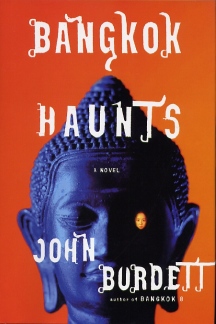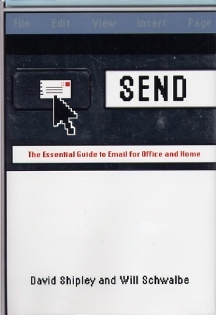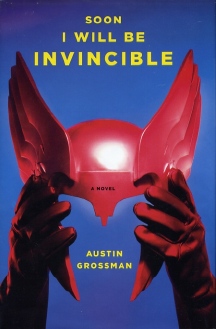Trashotron.com |
||
This Just In...News From The Agony Column
06-02-07: Preview for Podcast of Monday, June 4, 2007: "I blow stuff up real good."
Here's an MP3 preview of the Monday June 04, 2007 podcast for The Agony Column. Enjoy!
06-01-07: John Burdett Troubles 'Bangkok Haunts' ; Mario Guslandi Reviews Richard Gavin's Excellent 'Omens'
Spirits of the Ages
"Few crimes make us far for the evolution of the species. I am watching one now."
We can add the opening of John Burdett's 'Bangkok Haunts' (Alfred A. Knopf / Random House : June 5, 2007 ; $24.95) to the list of top first lines in crime fiction. But one of the greatest pleasures of Burdett's Bangkok novels is the voice of his narrator, Sonchai Jitpleecheep. Sonchai is back and as you might surmise from the first line, not happy. He's watching a snuff film with his sometimes-partner FBI Agent Kimberly Jones. The film is real. They have the body. It's Damrong, a famous prostitute and Sonchai's one-time lover. You won’t get past the bottom of page one before the word "demonic" occurs. And by page two, Jones is wondering, "What monsters are we making?"
The title should suggest to the astute reader that this time around, Burdett is going to plumb the supernatural aspects of adopted homeland. When Sonchai sleeps, he finds himself haunted by and seduced by Damrong, even though he's living with Chanya, a former prostitute who is pregnant with his child. The ghost will demand justice before it leaves Sonchai in peace. And from there on, it's DIVE into the depths of a world fuel by Internet pornography and the profits from yaa baa, that is our old friend methamphetamine. Sure there are users who manage some level of functionality, like Sonchai's boss Colonel Vikorn. When he gets wind that Sonchai is sniffing round an exclusive gentleman's club, he puts the kibosh on the investigation. But demons, Khmer sorcerers and high-tech ghosts are unwilling to be so easily shunted aside.
Burdett's novels are a delight for a variety of reasons. First and foremost, in Sonchai Jitpleecheep, he seems to have found a voice that almost makes it seem as if the novels write themselves. Sonchia is an unusual yet perfect narrator for a pitch-black noir procedural. He's a Buddhist who sees the world riddled with spirits and invisible scales toppling behind the low-life horrors of everyday existence in Bangkok, Thailand. He's in some senses sweetly sentimental and in other ways almost emotionless, at least to our Western eyes. Burdett's prose is endlessly entertaining even as he delivers a devastating critique of the way most of us live. There's a great sense of very black humor that informs the novels and makes the scenes of deep depravity and horror intrinsic, somehow necessary to understanding not just Sonchai's world, but our world.
'Bangkok Haunts' concludes with an appendix, a long article from the New York Times about the pornography industry, which is as one of the experts in the article puts it, "just happens to be a business where you can't lose money." It's a pretty fascinating article in view of what precedes it. Fiction fuels fact, lends it an immediacy, while the facts that follow the novel shine a light in to places where ... I'll let your imagination roam.
This sequel to 'Bangkok 8' and 'Bangkok Tattoo' is most certainly best read after reading the first two books in the series. The quality of the books is consistently high. Burdett offers a lot for readers of not just noir mysteries, but also science fiction, horror and fantasy readers as well. While his books deal in depravity and torrid / horrid sexuality, they don't however, have a prurient point of view. They’re not titillating and while the scenes often involve over-the-top horror, it's not the sort of porno-horror that often gets slotted in mysteries. If you've read the first two, you've been waiting for this title. Burdett will be touring in the United States in June, and he's well worth meeting. You can listen to my interview with him from 2005 here, and find a listing of his book tour here. But most importantly, you can find the books and immerse yourself in a world that is in fact our world. Though it will not seem as such.
Disquieting Dark Fiction
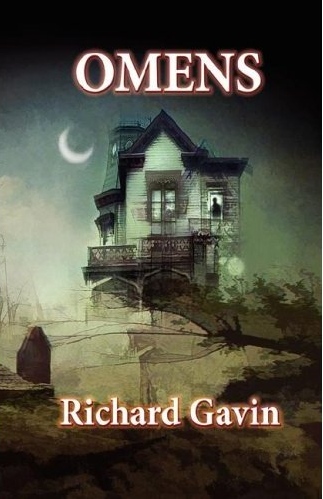 |
All
hail Harry O. Morris! |
Today, Mario Guslandi reviews Richard Gavin's 'Omens' from Mythos Books, a collection that elsewhere has drawn comparisons to Thomas Ligotti and Robert Aickman. Those authors have both created some of my most memorable reading experiences; this volume should do the same, and as a bonus, it's illustrated by Harry O. Morris. It's dark, disturbing and low-key, an excellent way to start the summer. You can read the review here, but I'd recommend that this book is not likely to be beach reading, both because Mythos makes fine books that deserve better than saltwater and sand and because well, that "quiet horror" vibe works better in an indoor environment. Basically, we all need a stuffy study in which to store and read our books. A very large study.
05-31-07: A Review of 'Send: The Essential Guide to Email for Office and Home' by David Shipley and Will Schwalbe
Common Sense and Uncommon Clarity
Today, I'm writing a review of 'Send: The Essential Guide to Email for Office and Home' by David Shipley and Will Schwalbe. Readers of this column might find it a bit surprising that I'm a big fan of Judith Martin, also known as Miss Manners. But I enjoy her tart sense of humor, her ability to make so-called common sense both clear and entertaining. A lot of what passes for simple civil discourse gets buried in the overheated emotions that arise as a matter of said discourse. It seems that any conversation, any series of successive ideas can be rapidly overshadowed by how we damn-well feel about those ideas. We live in the era of the shouting match.
Email is a huge culprit in this cultural sea-change. Some twenty years ago, I used really enjoy the escalating conversations that one had in the then-new USENET news groups, those forums where you could easily quote one writer and spar back with your best written bit of biting wit. It was and still can be fun to engage in the sort of arch-insult conversations that ensue, even as they fall victims to Godwin's law: "As a Usenet discussion grows longer, the probability of a comparison involving Nazis or Hitler approaches one." The idea here being that the longer a discussion in this format goes on, the more likely it is to degenerate into a series of mindless insults, exemplified by, "You’re a Nazi!" Once one party accuses another of being a Nazi, the subject itself has disappeared, and the form takes over. This sort of discourse used to only occur in Usenet, and there, well it could be easily ignored.
But as Email becomes ubiquitous, the "quote and destroy" style of personal interaction has also risen, and email itself is one of the major sources. You can hurt yourself quite effectively with email, even though you may think you know all the rules, and have all the admonitions firmly in mind. Moreover, that style of interaction can creep into behavior outside that of email. We're all the Doctor Strangelove of our personal lives, eager to launch a preemptive nuclear strike in order to prevent a mine-shaft gap. It's got to stop before it spreads into society at large, and this idea of preemptive action is writ large in the world.
Oh. Wait. Well, it's not too late to learn something useful about email, and here's where 'Send' comes in. It makes common sense about email clear as well as common, and chances are that if you read it, maybe at least one of the lessons within will stick. For me, it's been the "don’t fill the void with your anxieties" lesson; the idea that an unanswered email is automatically a "sign", that an absence of information is information. I'm not sure that lesson will stick for you, only that at least one will and you'll be glad you read the book. Here’s a link to my review. Do yourself a favor. Read it, let it convince you to buy the book, then read the book. You may decide not to send that one email, that single email that changes your life and not for the better. If you do decide not to send that email, you can even tell the authors about it via their website. Feel free to send me an email about your experience. And if I don’t manage to reply, try not to worry. It just means I'm busy. Really. My personal Defcon Four tends to keep me hopping.
05-30-07: Austin Grossman Promises 'Soon I Will Be Invincible'
Taking Your Superheroes Seriously (Funny)
It appears that we're going to be taking our superheroes quite seriously, with the result of seriously funny literature. And yes, while video games may have destroyed the minds of a generation of potential readers, they've also created a generation of talented writers. Naomi Novik, author of the Temeraire series, wrote for games, and in her interview she talked about the influence of her experiences on her novels. Now Austin Grossman, a key figure behind the games Deus X and System Shock, has unleashed Doctor Impossible in 'Soon I Will Be Invincible' (Pantheon Books / Random House ; June 5, 2007 ; $22.95), a novel that is impossible to put down. The gripping prose is so funny, so right on, you'll find yourself wanting to read every page, every paragraph, every sentence aloud.
The face mask that covers the book...
The novel alternates between the stories of Doctor Impossible, a failed supervillain, and that of Fatale, a novice superheroine. Doctor Impossible is an evil genius. "I don't know why it makes you evil," he tells us. "It's just what you find at the extreme right edge of the bell curve..." Unfortunately for the good Doctor, things have not worked out well. "I built a quantum fusion reactor in 1978, and an orbital plasma gun in 1979, and a giant, laser-eyed robot in 1984. I tried to conquer the world and almost succeeded, twelve times and counting." Thus he's packed away in a "facility rated for enhanced offenders...Now I have to shuffle through a cafeteria line with men who tried to pass bad checks." And the whole genius thing isn’t working out well. He's smart enough to wonder, "...whether the smartest man in the world has done the smartest thing he could with his life."
Fatale isn’t in the best of shape either, spending her nights in Boston, listening to the police scanner for people to save. "Becoming a superhero doesn't happen all at once, and by that point I was working the bottom end." When Corefire, Doctor Impossible's greatest foe, goes missing, she gets an invite to join the Champions and ... enough of plot summary. I'll leave that to the folks who work the PR dept and who did the dust jacket. But should you pick up this book in any bookstore, you'll not need a lot of plot summary.
What sells this book, what makes this book particularly good is Goodman's spotless, entirely engaging prose style. Goodman writes with a sparse wit that sparkles, a fervent belief in his world and his characters that makes them leap to life right off the pages, all the better to KAZAAM! and POW! right in your face. By offering two very opposing points of view, he gets us to the heart of both sides of the conflict in this novel, that of the experienced supervillain and that of the newbie superheroine. The appeal of the novel is that Goodman successfully makes both characters all too likable. Now, it's not hard to make someone like Doctor Impossible a sympathetic character. He's a witty bad guy, and they traditionally get all the best lines in the other superhero venues. To be sure, Grossman's best are startlingly spectacular. But on the superhero side, Grossman also succeeds wildly. He does so by doing what good science fiction writers have done for a long time, by taking his characters and his premise seriously, with results that proves to be quite entertainingly funny.
Grossman's world is meticulously constructed. I suppose it’s an alternate history of sorts, as I don’t recall any giant laser-eyed robots back in '84. For me, the biggest threat in '84 were the apocalyptic traffic jams that were expected in LA as a result of the Olympics. Like most apocalypses, it failed to materialize. Pantheon is marketing the novel as FICTION, not SF however, and that's just fine. They're well set to do so, as they're the imprint responsible for lots of great graphic novels, including 'Black Hole' and 'Alias the Cat'. Not surprisingly, this non-graphic novel – it is very much a piece of well-wrought fiction – gets a fantastic Chip Kidd double-cover, with a stark wraparound DJ and concealing a full-color cover.
The real surprise of 'Soon I Will Be Invincible', is however, what happens when you take off the mask. Grossman is a superbly engaging first-time author. Beyond the prose, you've got a great plot and lots of trenchant thoughts about our cult of individuality and our dreams of power. After starting the book, I went downtown to do some shopping and found myself expecting to see crowds of caped superheroes and costumed villains, not the throngs of ordinary Joes and Janes. Of course, none of us are ordinary. All of us conceal a superpower or two. But we all have our own personal kryptonite. Open this book up at your peril. The prose will immobilize you. You will not be inclined to put it down. It's kryptonite for readers. You are powerless in its presence.
05-29-07: A Review of 'Where's My Jetpack? by Daniel H. Wilson Ph.D.
Demand Your Future Now
It is, I assure you, complete coincidence that I've got an interview with Daniel H. Wilson Ph.D. for yesterday and book review of 'Where's My Jepack?' today. I try to present these reviews and interview in the order in which I read and interview, though circumstances sometimes move one author or book ahead in the queue. I suppose that I should not be surprised that it works out this way.
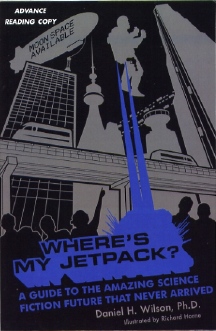
I would have chosen the flying car, but then, the jetpack works. For 30 seconds.
We live in a future that is very un-mysterious. Every event is pounced upon by a brigade of reporters, most of whom are overworked and underpaid. And that in itself is one of the few aspects of the future that has been correctly "predicted" by science fiction, as well as our frightening response to it. Look no further than Theodore Sturgeon's eerily prescient short story "And Now the News" for evidence.
For the evidence of why I enjoyed 'Where's My Jetpack?', Wilson's latest lark with how the future of the present shapes up against the future as seen in the past, you can read my review right here. Of course, you could have predicted that, right?
05-28-07: A 2007 Interview With Daniel Wilson
"A lot of these technologies seem like magic."
It's as much fun to talk to Daniel Wilson as it is to read his books. 'How to Survive a Robot Uprising' and 'Where's My Jetpack?' are both smart fun, and to my mind, very interesting as literary artifacts. Not that Wilson approaches them with anything other than, as he terms it, "a child-like optimism" – and of course, a PhD in Robotics from Carnegie Mellon. Combine the two and you get the essence of science fiction but in a very odd and unique format. Wilson is almost like the avatar of Analog magazine. He writes about stuff that is both startlingly real and as yet, unreal.
Doctor Wilson and I talked a lot about the relationship between science fiction, science, technology, futurology and ideas about predicting the future. He also brought up one of the really interesting concepts behind his new book, 'Where's My Jetpack?', which is that many of the technologies we create in fiction "fail to scale" when we think about executing them in the world in which we live. Of course, many SF stories and novels hang off that idea. But what Wilson brings tot he party is not just he SFNal image, but the history of the attempts to actually build our dreams. And again, the jetpack plays a prominent role, as there was one gent who was tasked by the military to build one and did indeed build one.
One.
And there's a little problem; as Doctor Wilson puts it: "You can have your dream of flight. Thirty seconds. That's it."
Fail to scale.
"If you’re the only guy in the world with a jet pack, or the only guy, or gal, with X-Ray specs, that's pretty cool," he told me. "But it just totally falls apart as soon as everybody gets one." And he points out that it's quite easy to argue that the automobile failed to scale, since, now that so many of us have them, we're killing one another on the highways so frequently that it's a shock we haven’t declared a "War against automobiles". Or maybe we need a war against highways. Until we declare such a war, I hope that listeners will enjoy the MP3 or the RealAudio version of this interview as they speed down the highway. Do pay attention to the road though, lest you fail to scale.
